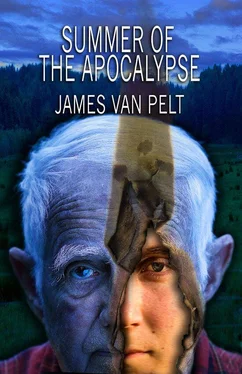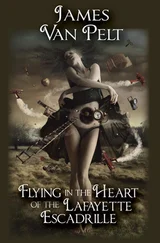“Yes,” said Eric. He looked back into the stars. Willow tree leaves rustled at the edge of the glade near the junction of U.S. 6 and Colorado 93 where they had eaten dinner in the dark before bedding down.
“Do you believe in ghosts?” asked Rabbit.
“Yes,” said Eric without hesitation. The answer hung in the air between them for a long moment. For some reason, with the start piercing the blackness above, with the little bit of breeze fluttering through the willows, he felt Rabbit had asked the most important question a human being could ask. We’re on the brink of understanding our world, thought Eric. It’s about ghosts, almost six-billion of them, and everything they left for us. Real ghosts, mythical ghosts and metaphorical ghosts. They’re everywhere. I can’t ignore them.
From the first day he’d left the cave, sixty years ago, he’d felt their presence in the empty streets of Denver, the broken windows, the parked cars. Ghosts and ghosts and ghosts. He remembered a sheet of newspaper blowing in front of him as he walked up Littleton Boulevard toward his home. It touched the pavement, then shot twenty feet up, then spiraled down again. It was if some invisible being were playing. And ever since, he’d felt ghosts like the pressure in the air before a storm. Did he believe? There was no way he could be who he was, he thought, if he didn’t.
Rabbit said, “I’ve talked to one.”
Eric shook his head. “Who? I mean, what do you mean?”
“Last month I talked to one. I was in the basement of a Big-O Tire store, scavenging, and when I came out, a girl was going through my backpack. She looked like she might be seven or eight years old. At least I think she was a girl. She looked like a girl, red hair tied back in a ponytail, leather skirt, no shirt. Anyway, she saw me and said one word, then ran. I yelled at her not to be afraid. Then I chased her, but she was fast. Squeezed through a crack in a brick wall and was gone.” She must have been fast, Eric thought, to get away from Rabbit, who was the quickest boy Eric had ever known. “What did she say? What makes you think she was a ghost?”
“I was south of town, east of the river.” Eric thought about the map of Denver in the Town Hall. Every community Littleton traded with was marked with red pins. All of them were north along I-25, what most people called the Valley Highway now. As far as they knew, no one lived to the south. If people lived in Colorado Springs, seventy miles away, the people of Littleton didn’t know about them. For all they knew, and all the fear they had of travel, the area south could be marked with “Here there be Dragons.” Rabbit continued, “I didn’t recognize her either, but that’s not what makes me think she was a ghost. I ran around the wall she jumped through, and she wasn’t there. There was no place to hide or anything. She just vanished.”
“What did she say to you?”
Rabbit lay back. In the darkness, Eric couldn’t read his expression.
“She called me a name.” Rabbit put his hands under his head. He stared into the sky like Eric had earlier.
“Maybe ‘called’ isn’t the right word. It’s more like she identified me, like if I looked into a box and there was a squirrel in it and I said, ‘squirrel.’”
“I understand,” said Eric.
“I startled her, I think. She looked at me and said ‘Jackal.’ Then she disappeared through the crack.” Far away, a long, lonely howl rose in the night. Another joined it. It’s the wolves, Eric thought. Rabbit shuddered at the sound.
“What’s a jackal, Grandpa?”
Eric listened to the wolves for a few seconds. Their voices mingled in eerie harmonics. “A jackal… it’s an animal that lives in Africa… a kind of dog.” He thought about it. The air suddenly cooled, like the breeze had pushed a patch of arctic atmosphere over them. He wrapped the sleeping bag tighter around his shoulders, then he chuckled. “Of course,” he said. “It makes sense. A jackal…” He pulled the bag around his ears. “…is a scavenger.”
The smoke on the streets in town didn’t look that bad. When Eric looked up, the swirls of ash turned the sky gray, and the stench of burning rubber and insulation seared his throat. He covered his nose and mouth with a bandanna. None of the houses or stores he passed on this side street were damaged, but boards covered many windows, and locks secured the gates. The buildings had a closed, protected look to them, as if they cowered in the face of the destruction. He couldn’t hear any birds. Since he’d entered town, he hadn’t heard a bird, a dog, a car horn or a siren. Nothing. He heard only his own sounds. Eric pushed his bike, approached an intersection slowly, peered both ways, then hurried across. He had no idea where the hospital or police station might be, the logical places to look for Dad. The light “ping” of a loose spoke every revolution of the wheel made him nervous. What if somebody heard him? What could he say? If people were shooting at each other on the highway the night before, maybe he would be mistaken for a thief or arrested for violating a “stay inside” order. His eyes watered, and half in frustration and half in fear he angrily wiped them with the heel of his hand. A glass-partitioned public phone kiosk on the next corner was vandalized, the glass shattered, and all that remained of the receiver was a nub of protruding wires. In the phone book he found an address for both the hospital and the police station, but there was no map, and the street names didn’t mean anything to him.
A white van roared down the street. Eric pushed himself against the remains of the phone, trying to disappear. A man in the passenger’s seat looked right at him. His eyes were small and cold, like a beetle’s. His mouth was straight and hard. Eric was glad they didn’t stop. He wouldn’t want to meet a man who looked like that.
Pieces of paper swirled in the wake of the van; its tail-lights flashed when it turned the corner a couple of blocks away. Eric rested his cheek against the phone booth’s cool metal. A minute later, a police cruiser with darkly tinted windows turned onto the street. He started to step out, to wave, then fear welled up, making him weak. Across the sidewalk, he saw a deep doorway to duck into, but there was no way to get there without being seen. He stayed in the kiosk and tried to act like he was busy, which felt ridiculous since the phone was broken. He opened the directory to the yellow pages and studied them. The car stopped at the curb, and the window rolled down.
A tired voice from inside said, “Sir, would you mind stepping next to the car?” Eric looked behind him. Nobody had ever called him “Sir” before.
“Me?” he said.
The voice deepened, became threatening. “Don’t make me get out.” Eric moved by the cruiser and bent so he could see in the window. What he noticed first was in the back seat, a stack of what he took to be heavy, black plastic tarps. Eric didn’t understand why tarps would have zippers on them though. Then he saw the officer’s revolver. His stomach gripped into a tight ball. The revolver rested on the seat, and the officer’s hand was on it. His mirrored sunglasses reflected a distorted picture. “Give me the stereo,” he said.
For a second Eric didn’t move. He didn’t know what the officer meant, then he unclipped the cassette player from his belt, disconnected the headphones and offered the player to the policeman. When he didn’t stir, Eric dropped it on the seat. It bounced once. Without moving his head, the officer’s hand floated from the gun and picked up the cassette player. He held it in front of his glasses, then floated it back to the seat. His movements were smooth and careful. Eric didn’t want to make him angry. The man made Eric think of a snake, a meticulous, cautious predator, ready to burst into motion any second.
Читать дальше












